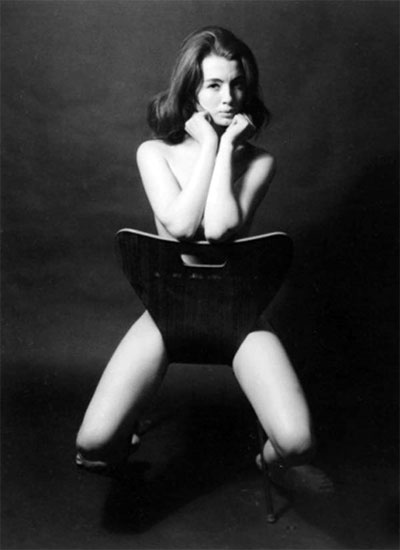
Facsimile Magazine, published by Haoyan of America. Volume One, Number Four, 2007. ISSN 1937-2116.
Facsimile April 2007
Table of Contents

Facsimile Magazine, published by Haoyan of America. Volume One, Number Four, 2007. ISSN 1937-2116.
Table of Contents
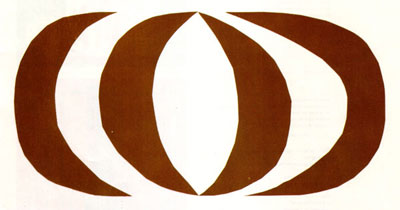
Two years ago Sister Mary Corita left Los Angeles' Immaculate Heart Convent, where she had been a nun for thirty years, to become Miss Corita Kent, artist. Cortia's art certainly is not in the kind of style you'd ever envision a nun's, even a former one. But Corita is an unusual person. Her medium is the serigraph, or silk screen print, which bombards the eye with Dayglo colors, pithy quotations from numerous sources (Camus, Peanuts, Beatle John Lennon, Rabbi Abraham Heschel, to name a few), and a generous sprinkling of ad slogans.
Corita's art can be found in the permanent collections of thirty-seven museums. She is responsible in part for advancing the silk screen process as fine art. Today Corita lives anonymously in Boston. She spends her days making pictures, sleeping (she was a chronic insomniac for years) and simply adjusting to living alone for the first time in her life.
Corita sits casually in an orange Eames chair with her dark hair pulled back loosely into a yellow chiffon scarf. A petite woman in her early fifties who looks younger, she has striking blue eyes and an infectious laugh. She serves tea in china bowls and then tomato, lettuce and cottage cheese salad. "I'm very shy about cooking for anyone," she apologizes. "I'm still such a novice at stuff like that." We talk about Vietnam, burglars, air pollution and the spreading maple tree in the street.
Her apartment is white and airy with brightly-colored Eames furniture, well-stuffed bookcases and dozens of thriving plants. In front of the fireplace is a low table fashioned from steel milk crates with a slab of marble for the top. On the marble stands a French wedding cake mold, that looks like a mini Mayan temple. "I haven't made a cake since I was very young, but if I did I'd like to use these molds," she says. Corita rearranges a little cerise scarf round her neck and settles comfortably in the chair, her knees displayed unselfconsciously beneath her shortish blue and black patterned dress. "What do you want to know?" she asks with amusement.
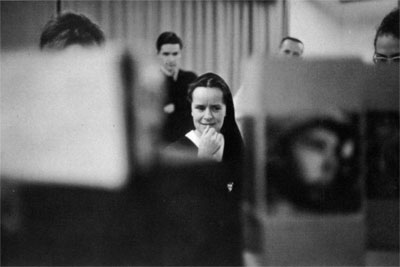
Rothon: What are you doing these days?
Corita Kent: Well... watching that maple tree grow outside. I've never had time to watch a tree before. Let me see... I'm doing a mural for the autopsy room at UCLA. The architect decided it would be great to have something bright to cheer up the cold situation there. One requirement is that I include, in Latin, the words which are probably familiar to all medical students: Out of death comes life, or something like that. The mural will be three feet by four feet. They will ship in three panels which I'll paint and send back. I've also been illustrating books. My sixth book is being published in autumn. It's called Damn Everything But The Circus. Personally I find circuses boring but the theme from an art point of view is exciting. After all, life is a circus. Mmmmm... I'm doing a few record jackets, a few posters, a new batch of serigraph prints. I'm a great procrastinator but once I get going I can really do lots of work. I've also been going to California periodically, partly because it's family and partly because I have a small gallery there
Rothon: Do you miss teaching?
Corita Kent: No. I'm a bum by nature. I was head of the college art department for several years and enjoyed teaching very much but it was always very hard for me in the sense that - I suppose it was the kind of thing that actors have with stage fright, some just never get over it. I never felt: Now I know how to teach. Teaching was always a great challenge to me.
Rothon: I believe you used to take your art students to places like car washes to teach them that beauty exists in ordinary things. Can you find beauty in a pile of trash?
Corita Kent: Well, yes, you really can. If you sit and look at the kinds of colors that are in a pile of trash... someone once asked me this about an automobile accident because I said everything has possibilities. You see a hurt person, is that in a sense beautiful? If you could not be a human being and not know that was a human hurt, or if you could not be a human being and not know that garbage was harmful and destructive and just looked at it taken out of context. You see, if something is taken out of context and put in a frame living its own life then the colors, shapes and forms can be beautiful.
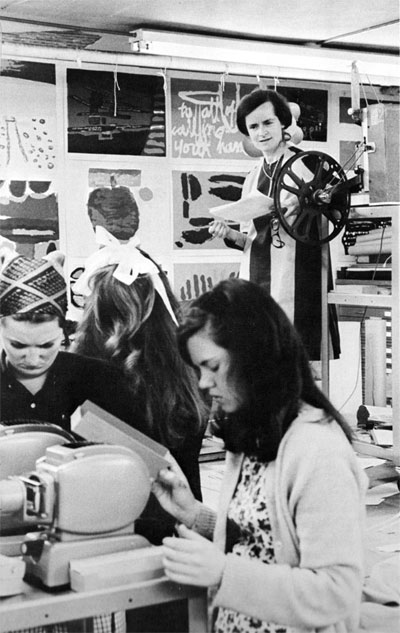
Rothon: Were you a difficult teacher?
Corita Kent: You mean difficult for my students? Yes, I know I was. I was a big old taskmaster and gave fantastic assignments. I don't suppose they ever screamed at me but they'd complained lots. One of the reasons I stopped teaching, I say it laughingly, was that I became a kind of celebrity and it started getting in the way. There would be visitors, very well-intentioned, who just wanted to meet - this sort of thing. Some of this was interesting because it brought interesting projects for the students to work on. For example, we did a huge exhibit for two sides of the IBM building. But I think some of the students resented my fame because whenever they would do something they would be labeled as my students. I didn't give two hoots but they did. Some felt it was taking the credit for their work as well. But in another sense I left the college to do my own thing.
Rothon: Did you reflect the Vietnam war in your art teaching?
Corita Kent: A lot of the work I did had to do with words. I've always worked a great deal with words. The different displays and projects were always laden with social implications. I'd say to my students: Go find one hundred statements or one hundred names of people who have made a step towards peace and find out what that step was.
Rothon: You constantly quote people in your work. Recently I noticed you quoted Beatle John Lennon. Why?
Corita Kent: Because he said some wise things.
Rothon: How did you feel when he made statement about the Beatles being more popular then Jesus?
Corita Kent: I think he explained that very beautifully. What he really meant was in fact the Beatles are more popular, especially with young people today, but this didn't in any sense mean that they were better than Christ. Lennon made this marvelous statement saying that he really believes in Jesus, but a lot of his followers got this message garbled and I think that was very true.
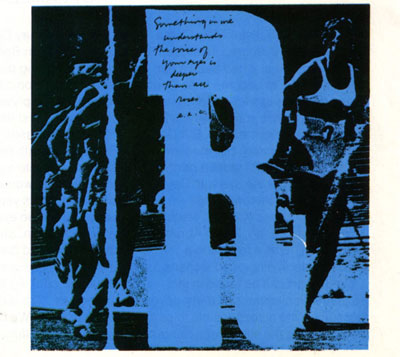
Rothon: Do you think you've changed much in the last couple of years? When you resigned you were quoted as saying: 'I agonized over the decision for six months.'
Corita Kent: I didn't say that, someone else did! But it was a serious decision to leave the convent with its consequent problems and troubles.
Rothon: Do you regret the decision?
Corita Kent: No. I could have gone back. there have been a great deal of changes in my life. I lived in a house with about 110 marvelous people, and that was a very stimulating kind of life. Now I'm living by myself, really for the first time, and learning little things like how to cook and all kinds of stuff. Somehow I can never catch up. I've cut out a life involved with that many people. I moved away from Los angeles simply because there were too many people I knew and it's too involved at the moment. Now I'm living in Boston, where no one really knows me, and in one sense it's very nice, comfortable thing. I can relax and do things slowly without being sidetracked as much.
Rothon: Do you lead a conventional life?
Corita Kent: Pretty conventional. Most people would find it rather quiet. I have a lot more time for thinking. I've had insomnia for a number of years. I was involved in too many things and was constantly trying to remember stacks of deadlines; it became very tense building. I'm learning to sleep now. I just sleep at different times - whenever I feel like it. I've been watching television more than I've ever watched it in my life. I was always rushing by a set. I've always thought it was a great crime that teachers were so uninvolved in television. They were busily teaching kids how to read, but no one, until recently, has taught them how to watch television or how to be critical of it. I can hardly bear to watch a lot of the programs but people always have the choice of switching off the set.
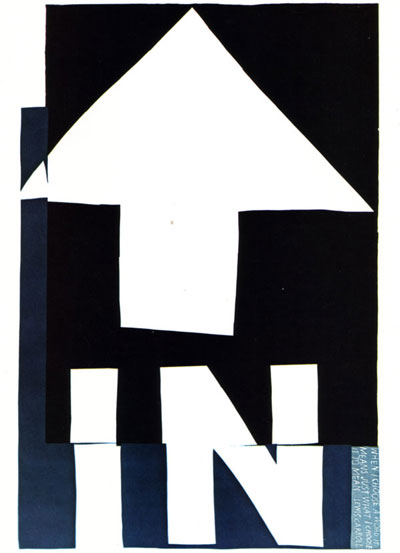
Rothon: Once you were quoted as saying that people should read the latest novels and go to the latest avant garde plays. Have you seen Hair?
Corita Kent: Yes, and I enjoyed it very much.
Rothon: Have you read Portnoy's Complaint?
Corita Kent: Yes, and I thought it was hilarious.
Rothon: Do you believe in censorship?
Corita Kent: Yes, I do believe in censorship if you take it to mean an inner discipline one has built up from which one makes responsible judgments. Censorship or discipline from without comes from a less good direction. It may be necessary in extreme times or in extreme cases but the ideal is that good old sound from within the person himself. Hopefully parents and teachers work with the young to help them form their own inner discipline and censor. I used to say, but I guess it's not true, that if you saw enough good things the bad things would be so boring you just wouldn't want them. People need to develop a great kind of discrimination because there isn't all that much time to see that much junk. It is - how would you say it? - a thinning or watering down of life to let yourself to be exposed to rubbish. In a family the older ones have the advantages of many real life experiences and can be immensely helpful in handing on our tradition of freedoms, but the young coming up (perhaps this time to an even greater measure than ever before) have new ideas and braveries to offer their elders. They have a huge part to play in changing man's views on settling disputes by killing, but no one has a corner on truth - we all discover it together by pooling information and experience. The danger is that young or old might assume they owned the corner and tried to force the others their point of view. Human beings can become very ugly when forcing or being forced.

Rothon: What are your feelings about advertising?
Corita Kent: Advertising has influenced my work in several ways. Some of the best artists are in this field. Great photography and very good writing have been stolen from other fields to sell stuff that people don't really need. That gets us back to the censorship thing - or the discipline. You can enjoy the quality of the ad and not let them pressure you to buy what you don't really need. I have fun taking back superlatives and just ordinary good words and phrases from ads and trying to restore some of their life in them. Words have life and must be cared for. If they were stolen for ugly uses or careless slang or false promotion work they need to be brought back to their original meanings - back to their roots. I have done ads for Group W - the broadcasting arm of Westinghouse. I feel broadcasting is very important for our time when we are all being "newsed" by the media instead of carrier pigeons or stage coaches bringing the mail. I believe we should all work on communications as artfully as possible. recently, someone asked me how I could work on advertisements knowing all my beliefs and I said really I felt in all sincerity that it is very difficult... you get up in the morning and immediately are involved in somehow helping the war effort or helping big business or whatever; but I said the important thing is to be as aware as you can that this is happening and there isn't a way of escaping. I said my conscience was much guiltier when I paid my income tax than when I worked for Group W. I feel good about being associated with the men I know at Group W. They are honesty trying. Certainly there are companies I could work for. A person has to be his own censor. Ads don't convince me that I need a new car every so often or that I need this or that. I have enough discipline.
Rothon: How would you describe your art?
Corita Kent: I make my pictures in a sense to suit myself, hoping that some others may find them suitable, too. In a way my pictures are a continuation of the old God-Bless-Our-Home samplers - most of them contain words, and this is a very old tradition, centuries old. As important to me (if not more so) are the shapes and colors of words. They should be fun to look at, even if one doesn't understand English. I guess it's the way I have always enjoyed oriental calligraphy. I simply like the shapes of the characters. I also respect the word and like to see it sometimes taken off the printed page or 'illuminated' so to say - this becoming something between speaking and type-set page.
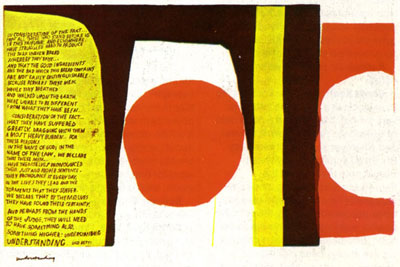
Rothon: Have you been influenced by any artist?
Corita Kent: I am influenced by all that I see and hear. I was very much influenced by Ben Shahn. (The late Ben Shahn once said Corita has "joyfully revolutionized all type design.") I liked Ben Shahn first for his line drawings, then for is use of words in pictures, and finally for his making his own social or political stand in his pictures. I feel a kinship here - those three things seem important to me now but probably in a reverse order. I really admire the way he was involved in things he cared about; this has always seemed a very natural thing for me to do. I'm not a picket woman, though I admire people who are; I'm not brave enough not to pay my income tax and risk going to jail. But I can say rather freely what I want to say in my art.
Rothon: Who is your audience?
Corita Kent: I would say mainly young people, though not completely. I have great empathy with the young. You look to the future and they are the future.
Rothon: How much does your art cost?
Corita Kent: Because of the nature of the original prints, the cost is low average compared to general print prices. But for a young person who is used to buying a poster for a dollar, to pay $20 or $30 or $40 for a print is often out of the question. There's no possibility of lowering my prices because someone has to pay the rent, insurance and the printing costs, etc. I lead a rather complex financial life. I have about twenty-five galleries in the United states who handle my prints. I'm really running a little business. So I have an accountant to handle my affairs.
Rothon: Tell me about your family? Were your parents artistic?
Corita Kent: My father probably was but he was too busy earning food for sic kids. He worked for a furnace company at one time - oh, he did various things. He was a great poet at heart and played the piano even though he never took lessons. His talents were never developed.
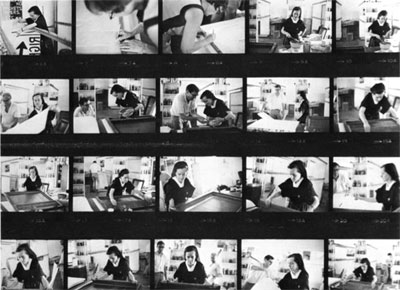
Rothon: What age did you started painting?
Corita Kent: I was always interested in school. I have marvelous memories of most of my teachers, except in second grade I had a hideous witch. Most of them were very interested in art, which wasn't the general thing in schools back at that time. My parents, as I look back, were very sensible. They never made a great big thing about art but I always knew they thought it was a good thing to be doing.
Rothon: Where were you born?
Corita Kent: In Fort Dodge, Iowa, but we moved to Vancouver when I was about a year old. We came to Los Angeles a couple of years before I started school. I entered the Community of Immaculate heart Sisters when I was eighteen.
Rothon: What part does religion play in your life now?
Corita Kent: I have more time for it, which sounds rather ironic, and I think a deeper part. I have more time for contemplation, less rushing around.
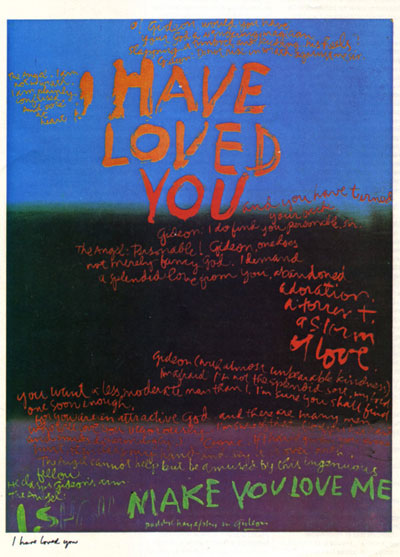
Rothon: Have you thought about getting married?
Corita Kent: Yes, in an abstract sort of way. I'm certainly not against the idea. If I met a simply marvelous man who wanted to marry me then I probably would. But I'm leading a very quiet life at present. I'm still adjusting. Also there's a shortage of men!
Rothon: Do you miss wearing a habit?
Corita Kent: Hmmmm. I'm trying to think back. In a sense the habit was very simple. It eliminated a great deal of decisions. You knew what to wear, and wherever you went it was okay. But then I think gradually we all caught onto the fact that the impression it was having, and I say impression in a very deep sense, on other people was exactly the opposite of what was intended. This made the habit distasteful to a great number of us. I've always been clothes-conscious. I notice what people wear because I think what people wear and how they fix flowers and how they fix a meal are some of the very basic arts that people are still involved in at a good solid folk level. It's not fine art but it's very close.
Rothon: Do you like housework?
Corita Kent: No, I don't care for it at all. I'm not a terribly good housekeeper. Occasionally I'll zoom through when it strikes the mood right.
Rothon: How did you set about furnishing your apartment?
Corita Kent: One of the people who has been most influential in my life and thinking has been Charles Eames. I just consider him a great man, a great teacher and a great film maker. I know his furniture very well and it was easy for me to choose things quickly. I used all his furniture except for that good old rocking chair which I couldn't resist. I don't like the gray tiles in my bathroom; I'm planning to cover them with gold paper. I think it will be rather stunning. I thought about getting a pet. I have a friend who breeds birds - there is probably a word for bird breeders - but I travel too much, and I'd have to find a bird-sitter.
Rothon: What new things would you like to accomplish in the future?
Corita Kent: Well, I keep on looking at that maple tree outside. I moved to this place in October and the tree was in full leaf then. I watched it lose its leaves. I watched it covered with snow. Then these little green flowers came out and it didn't look like a maple tree at all. Finally the leaves were recognizable as maple leaves and that in a way is very much how I feel about my life. It seems a great new stage for me - whether it will ever be recognizable by anyone else I don't know, but I feel that great new things are happening very quietly inside of me. And I know these things have a way, like the maple tree, of finally bursting out in some form.

Original interview by Pamela Rothon
Images courtesy of the United Church Press
Editor's Note: Corita Kent passed away on Sept. 18, 1986 in her home after a long fight with cancer. Amongst her most famous works were her 1985 Love stamp design for the USPS and the 150-foot-high Boston Gas natural gas tank.


Boston Gas Tank. Photography by Peter Kaminski.
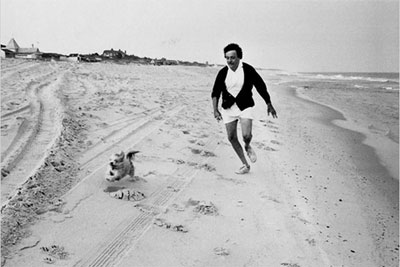
Photography by Jill Krementz.
"And if I should ever die, God forbid, I hope you will say, 'Kurt is up in Heaven now.' That’s my favorite joke." Kurt Vonnegut, Jr. passed away at the age of 84 on April 11, 2007, in Manhattan, New York. His last book, in 2005, was a collection of biographical essays, “A Man Without a Country.” It concludes with a poem called “Requiem,” which has these closing lines:
- When the last living thing
- has died on account of us,
- how poetical it would be
- if Earth could say,
- in a voice floating up
- perhaps
- from the floor
- of the Grand Canyon,
- “It is done.”
- People did not like it here.
By way of Gizmodo
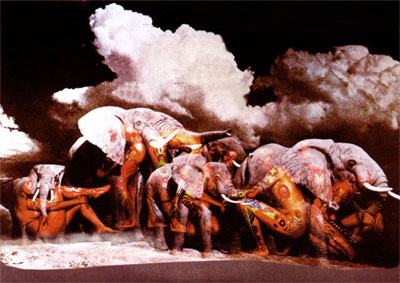
An elephant's memory is legendarily large, and so was the size and scope of the New York band that went by the same name. Unlike some other horn-rock ensembles of the late-'60s that took advantage of the freedom to expand rock's size and sound, however, Elephants Memory weren't merely a rock band with jazz overtones. There was plenty of pile-driving rock'n'roll, and a good deal of jazz of both the free and big band varieties. But there was also soul, spaced-out psychedelia, and pop -- not just over the course of the entire album, but sometimes within the space of a single song -- and what can only be described as downright strange lyrics about hot dog men, yogurt, love as a jungle gym, and "Old Man Willow." Some of it was written by the guy who'd go on to produce David Bowie, some of it would end up on the soundtrack to the classic movie Midnight Cowboy, and the whole shebang was produced by the guy who'd go on to produce the Partridge Family. If Elephants Memory were a strange band, they were certainly no stranger than their surroundings, with second-degree-separations between the careers of not only Bowie, Midnight Cowboy star Dustin Hoffman, and the Partridge Family, but also the Beatles and Carly Simon.
From the liner notes of Elphants Memory's Elephants Memory by Richie Unterberger
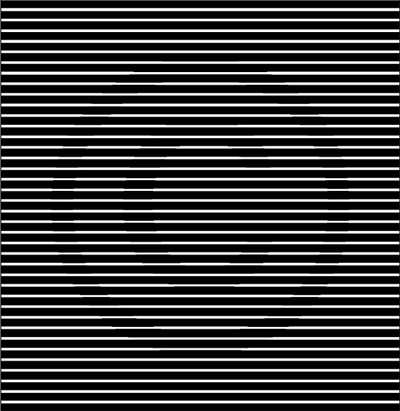
From Stanford law professor Lawrence Lessig (Code; The Future of Ideas) comes this expertly argued, alarming and surprisingly entertaining look at the current copyright wars. Copyright law in the digital age has become a hot topic, thanks to millions of music downloaders and the controversial, high-profile legal efforts of the music industry to stop them. Here Lessig argues that copyright as designed by the Framers has become dangerously unbalanced, favoring the interests of corporate giants over the interests of citizens and would-be innovators. In clear, well-paced prose, Lessig illustrates how corporations attempt to stifle innovations, from FM radio and the instant camera to peer-to-peer technology. He debunks the myth that draconian new copyright enforcement is needed to combat the entertainment industry's expanded definition of piracy, and chillingly assesses the direct and collateral damage of the copyright war. Information technology student Jesse Jordan, for example, was forced to hand over his life savings to settle a lawsuit brought by the music industry—for merely fixing a glitch in an Internet search engine. Lessig also offers a very personal look into his failed Supreme Court bid to overturn the Copyright Term Extension Act, a law that added 20 years to copyright protections largely to protect Mickey Mouse from the public domain. In addition to offering a brilliant argument, Lessig also suggests a few solutions, including the Creative Commons licensing venture (an online licensing venture that streamlines the rights process for creators), as well as legislative solutions. This is an important book. "Free Cultures are cultures that leave a great deal open for others to build upon," he writes. "Ours was a free culture. It is becoming less so."
Description copyrighted Reed Business Information, a division of Reed Elsevier Inc. via Amazon
Editor's Note: Lawrence Lessig's book is free for viewing and download via its website.
By way of Jon Satrom

James Doohan played chief engineer Montgomery “Scotty” Scott on the original Star Trek TV series. Doohan was the only actor in Star Trek to have a stunt hand. During D-Day he was shot eight times, and the middle finger of his right hand was blown off. Whenever a close-up was needed of Scotty’s hand, the stunt hand would be deployed.
He was offered the part after a director noticed his uncanny ability to mimic foreign accents. During the audition, Doohan tried out several voices - like French and German - before deciding to settle on a Scottish accent and then choosing the character’s name himself.
As is almost traditional for Star Trek actors, James Doohan didn’t always see eye-to-eye with William Shatner. “I wanted to thump him on more than one occasion, he believes the world orbits him,” he once recalled.
Original article by Stuart Heritage via Hecklerspray
Editor's Note: The remains of Star Trek creator Gene Roddenberry were blasted into space a decade ago, in 1997. James Doohan died on July 20, 2005 at age 85. Doohan's ashes are to be sent into space at his request. The ashes, along with those of Mercury astronaut Gordon Cooper as well as 200 others, are set to be launched on the SpaceLoft XL rocket, on April 28, 2007.
By way of Boing Boing
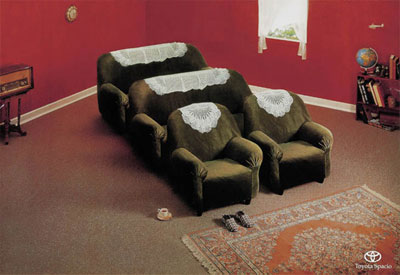

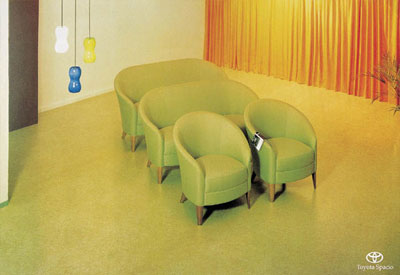
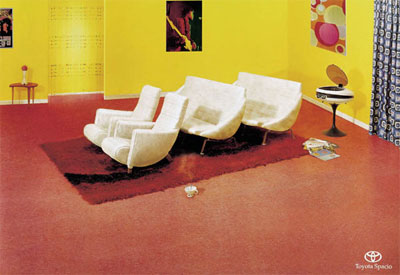
By way of Moka-Break
My, have we come along way. From playing with sticks and experimenting with fire to robot vacuums that automatically clean your house to the computer from which I am typing this. No more cave drawings thanks to the wonders of language and communication.
It's really too bad we couldn't have been better to each other during our stay. Funny how that works. We can build a bird feeder that doubles as a cappuccino maker, but so many of us cannot even be civil towards each other. Advanced, maybe. But civilized? Not quite. I suppose tolerance was just overlooked. But I suppose that's just human nature.
Anyhow, my one hope is that everyone had at least a minute, just one moment in life, where a wave of sheer happiness and contentment hit. Something so wonderful that spurs a secret smile that the lips couldn't help but curl into.
But before I finish penning this letter.
Good night, moon.
Cheers to uncertainty,
Frisbee Jackson

